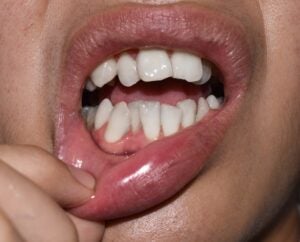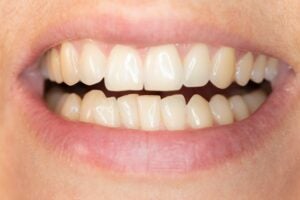-
Detecting Dental Issues Early: The Importance of Regular Checkups
 The Importance of Early Intervention
The Importance of Early InterventionDoes the recommendation of twice yearly checkups seem like overkill to you? It’s not. Regular dental visits give the dentist a chance to become familiar with your mouth, and notice any changes in your oral health. That way, small problems can be addressed before they become major issues. From tooth decay to gum disease, dental issues that are detected early can be managed before they become difficult and expensive to treat. Continue reading “Detecting Dental Issues Early: The Importance of Regular Checkups”
-
Debunking Root Canal Myths
 Root canals get a bad rap. If you need a root canal, you may be filled with worry and have significant concerns regarding the procedure, the pain, and the treatment. Have no fear. The experts at Park 56 Dental are here to dispel the rumors regarding root canals. Getting a root canal may not actually be as bad as you think. Here are some common myths about root canals and the actual benefits of getting one.
Root canals get a bad rap. If you need a root canal, you may be filled with worry and have significant concerns regarding the procedure, the pain, and the treatment. Have no fear. The experts at Park 56 Dental are here to dispel the rumors regarding root canals. Getting a root canal may not actually be as bad as you think. Here are some common myths about root canals and the actual benefits of getting one.Continue reading “Debunking Root Canal Myths”
-
Ways to Freshen Your Breath When You’re On the Go
 You keep your teeth nice and clean and your breath fresh. Maybe you pride yourself in your sparkling smile and fresh breath. However, when you’re away from home or keeping a busy schedule, it can be hard to keep that breath as fresh as you’d like. What are some ways to keep fresh breath on the go? Here are some helpful tips for freshening your breath when you’re on the go.
You keep your teeth nice and clean and your breath fresh. Maybe you pride yourself in your sparkling smile and fresh breath. However, when you’re away from home or keeping a busy schedule, it can be hard to keep that breath as fresh as you’d like. What are some ways to keep fresh breath on the go? Here are some helpful tips for freshening your breath when you’re on the go.Continue reading “Ways to Freshen Your Breath When You’re On the Go”
-
How Crowded Teeth Affect Your Oral Health
The Impact of Crowded Teeth
 If you have teeth that don’t seem to fit into your mouth, it probably makes you feel self-conscious about the way you look. Would it surprise you to learn that crowded teeth can affect more than just your self-esteem? Beyond the aesthetic impact, crowded teeth can lead to an increased risk of tooth decay, excessive wear, speech problems, and even TMJ disorders. Let’s take a look at the effects of crowded teeth, and how you can solve the problem.
If you have teeth that don’t seem to fit into your mouth, it probably makes you feel self-conscious about the way you look. Would it surprise you to learn that crowded teeth can affect more than just your self-esteem? Beyond the aesthetic impact, crowded teeth can lead to an increased risk of tooth decay, excessive wear, speech problems, and even TMJ disorders. Let’s take a look at the effects of crowded teeth, and how you can solve the problem.
Continue reading “How Crowded Teeth Affect Your Oral Health” -
Reasons Why Your Teeth Misalign
The Prevalence of Misaligned Teeth
 If your teeth are misaligned, you are not alone. In fact, about 90 percent of people have at least a little bit of misalignment. Your crooked teeth could be the result of genetics, childhood habits, injuries, tooth loss, or poor oral hygiene. Understanding the causes of misalignment is the first step towards finding a solution for your misaligned teeth, and possibly averting dental complications.
If your teeth are misaligned, you are not alone. In fact, about 90 percent of people have at least a little bit of misalignment. Your crooked teeth could be the result of genetics, childhood habits, injuries, tooth loss, or poor oral hygiene. Understanding the causes of misalignment is the first step towards finding a solution for your misaligned teeth, and possibly averting dental complications.
Continue reading “Reasons Why Your Teeth Misalign” -
What Are All-on-4 Dental Implants?

All-on-4 dental implants are a groundbreaking option for those who have lost all or most of their teeth. This dental procedure offers a stable and long-lasting alternative to traditional dentures, providing both functionality and aesthetics. Understanding what All-on-4 dental implants are and how they work can help those considering this option make an informed decision.
Continue reading “What Are All-on-4 Dental Implants?”
-
The Connection Between Snoring and Your Dental Health

Snoring affects millions of people worldwide. While it is often regarded as a minor inconvenience, snoring can sometimes signal underlying health problems, including those related to dental health. Understanding the connection between snoring and dental health can help you deal with the root causes and improve your overall well-being.
Continue reading “The Connection Between Snoring and Your Dental Health”
-
How Improving Your Dental Health Can Make You Happier

Maintaining good dental health is often seen as a fundamental aspect of overall well-being. While the benefits of brushing and flossing are well-known in terms of preventing cavities and gum disease, the positive impact of good oral hygiene extends far beyond just a healthy smile. In fact, improving your dental health can cause you to feel happier and improve your quality of life.
Continue reading “How Improving Your Dental Health Can Make You Happier”
-
The Ultimate Guide to Tackling Tooth Sensitivity
Understanding and Managing Tooth Sensitivity
Tooth sensitivity is a common dental issue that affects many people worldwide. It’s defined by a sharp pain or discomfort in the teeth when exposed to certain stimuli, including cold, hot, sweet, or acidic foods and drinks. The sensation can be temporary or chronic, but regardless of its duration, it significantly impacts one’s quality of life. This guide aims to provide comprehensive insights into the causes of tooth sensitivity and offer practical solutions to manage and reduce it effectively. Continue reading “The Ultimate Guide to Tackling Tooth Sensitivity”
-
Flu, Allergies, or Tooth Ache?

Woman unsure if she’s experiencing flu, allergy, or tooth ache symptoms.
Seasonal Health Dilemmas
Navigating the murky waters of cold weather ailments, many of us find ourselves puzzled: Is it the flu, allergies, or just a toothache? This confusion is not unfounded, as the symptoms of these conditions often overlap, affecting our oral health in unexpected ways.
The Flu and Oral Health
The common cold and the flu are notorious for causing discomfort beyond just a runny nose or a cough; they can also lead to tooth pain. This is primarily due to the close relationship between our sinuses and oral health. When we’re battling a cold or the flu, the inflammation in our sinuses can exert pressure on our dental nerves, particularly those near the upper teeth, causing a sensation that mimics tooth pain. This phenomenon, often mistaken for dental issues, is actually a side effect of our bodies fighting off the infection.
Medications and Oral Hygiene
Moreover, our oral health can take a hit during illness due to the medications we consume. Decongestants, while relieving nasal congestion, can lead to dry mouth by reducing saliva flow. Saliva is important for washing away food particles and bacteria, protecting our teeth and gums. A decrease in saliva can increase the risk of tooth decay and gum disease, exacerbating the sensation of tooth pain.
Allergies and Tooth Pain
Seasonal allergies compound this issue by affecting our oral cavity. Allergies can lead to sinus congestion and inflammation, putting pressure on our teeth and causing pain, particularly in the upper molars. This pressure is often due to the swelling of the sinus tissues, which, in turn, press against the roots of the teeth. The use of antihistamines, a common remedy for allergies, can also contribute to dry mouth, further increasing the risk of dental discomfort.
Maintaining Oral Health During Illness
Maintaining oral hygiene becomes even more crucial when we’re under the weather. Brushing, flossing, and staying hydrated can mitigate the effects of colds, the flu, and allergies on our oral health. However, distinguishing between a toothache caused by sinus pressure and one resulting from dental issues is essential. If tooth pain persists beyond the illness or is localized to one tooth, it may be time to consult a dentist.
Navigating Oral Health Through Seasonal Challenges
In conclusion, while the flu, allergies, and toothaches may present with similar symptoms, understanding their interconnections can help us better manage our health during these trying times. Regular dental check-ups, along with proper hygiene practices, can go a long way in keeping our teeth and gums healthy, regardless of the seasonal challenges we face.
Need assistance with a toothache?
Park 56 Dental has been the trusted solution in NYC since 1997. Our skilled team offers personalized care, from pediatric to sedation dentistry. Book a complimentary consultation today to address your sensitivity concerns and explore tailored treatment options. Experience comfort and convenience with our modern practice and comprehensive insurance coverage. Schedule your visit online or at 646-679-3973 now and start your journey to a sensitivity-free smile!
RECENT POSTS
categories
- Uncategorized
- Cosmetic Dentistry
- Veneers
- Healthier Teeth
- Teeth Whitening
- Dental Health
- Video
- Dental Emergencies
- Invisalign
- Dental Implants
- Root Canal
- Sedation Dentistry
- Infographic
- Dental Crowns and Bridges
- Dental Anxiety
- Gum Disease
- COVID-19
- Bad Breath
- New York Dentist
- Cut out sugar
- General Dentistry
- Oral Health
- Oral Cancer
- Dry Mouth
- Gum Health
- Toothache
- Dental Sealants
- Cavities



